Outside of being the reviews editor here at Digital Camera World, I am also a professional photographer and videographer and I have been lucky enough in my career to work with some really cool brands and photography has taken me to some amazing places. Over the years I have picked up a few tips that have helped me get to where I am today, so here is a selection that I think can help any aspiring photographer or videographer looking to make it in the industry.
1. Your gear is not important
You have probably read endless blogs and opinion pieces about which is today’s best camera, how Sony cameras destroyed Canon, how the new Canon EOS R5 makes all other cameras obsolete. Many of them are probably on this very website.
Okay, truth time, news and blogs create this content for content's sake, it's how we stay in business, and the brands serve us these marketing mistruths of how new cameras enable all these pioneering possibilities for photographers that were simply never possible before.
Well yes, a slightly higher frames per second is nice, and those two extra megapixels I’m sure are magnificent, but turns out people have been creating stunning, moving and most importantly, timeless images for over a century. Some of the best creators today work with phones, low-end DSLRs, and gosh, outdated tech!

Trust me, other people right now are creating masterpieces with the camera you already own! The classic saying applies here – the best camera is the one you have with you. If your pictures are not coming out how you would like them, a new camera is not magically going to solve all your issues. It doesn’t matter what camera you use, if you don’t know how to use it. A far better investment would be to spend that money on workshops, experiences, or just good old practice to better understand the equipment you already have and how to create with it. Which leads us onto...
2. Stop watching YouTube
Okay, so YouTube is an amazing place to learn the basics of photography, pick up tips and get inspired. I used it a lot when I first started photography and still do today. However, if you are a photographer that just follows step-by-step guides, or produces carbon copies of what you see online, then are you really a photographer? Gordan Ramsey doesn’t still follow a cookbook.
YouTube learned photographers are a clear homogenous group, there is a clear trend emerging, especially apparent on Instagram, of work being very repetitive. You have probably seen many examples of it, from every milk bath, to every person looking out on a mountain edge, surrounded by overly punchy blacks and washed-out greens.

You should challenge yourself to be creative in your own right, scrap the guides, drop the blogs and turn off YouTube. Be inspired by what you have seen online yes, but invent your own project or throw yourself headfirst into aspects of photography you have never tried before. Ditch all those Lightroom presets you bought online from your favorite YouTuber and try making your own preset entirely from scratch in your own style.
A constant obsession with what should I be doing distracts from the possibilities of what could I be doing. And, if you get it all terribly wrong, then keep reading.
3. Embrace your terrible photos
I take bad photos, everyone does, I bet Annie Leibowitz has a draw full of absolute stinkers somewhere. Learning from your mistakes is how the world has worked for millennia, and this is exactly how I learned what to do and what not to do in photography. I have learned as much about my camera and photography from thinking 'how do I do that?' as 'why was I doing that?!'.
If you want to try something, and you think it might work, even if it goes against what you have read online, disregard it all and do it anyway. Doing things wrong will encourage creative thinking and problem-solving, enabling you to think about photography and your camera in entirely different ways, open your workflow to trying out new tools and camera techniques, and produce unexpected and often surprisingly effective results you never would have achieved otherwise.
4. People won’t find your work if you don’t promote it

One of the biggest misconceptions I hear when talking to newbie photographers is that clients will just find you and come to you for work. Now I am not arguing that this can never happen, but the reality is, for almost everyone that will not be the case.
So, what do you do? Successful photographers take social media seriously (even if they claim they don't). The best thing to do is come up with a comprehensive promotional plan covering all bases; from having a captivating website, listing your website in the right places, ample social media, and maybe paying for some promotion.
Social media doesn’t just entail posting new images on your channels, you have to master timing, hashtags, and being part of online social groups. It’s also not just about what you put out there, it is about others too, you have to make sure you spread your likes around, comment on others’ pictures, consistently follow new people, and champion others’ work. All of this not only contributes to social media companies’ algorithms pushing your content to new people but helps build community around your work compounding the success of your future posts.
So, who said photography is just taking pretty pictures?
5. The professional photography industry isn’t about taking pictures
The photography business doesn’t have much to do with taking pictures, sure you might take a few snaps, but the act of photography is the smallest fraction of what you'll actually do in your professional life.
Firstly, you have all the business management side of things, this is your usual things like website maintenance, updates, managing Google and ads, financial planning, insurance, and tax responsibilities. Then there is planning, creating, and implementing a comprehensive social media plan (see above). Responding to leads and queries from clients, putting together quotes and cost analysis, and creating invoices.
Following this you have to deal with your new clients, this would most likely involve hours of additional pre-photography consultation and planning depending on the client. Whilst many clients trust me to follow a concise consultation and do my job effectively, there are many where I receive a constant stream of feedback, with dozens of calls a day leading up to the shoot, all of which have to be dealt with.
You then get a chance to briefly take some pictures.
Then comes the post-production, often misleadingly simplified as "editing", but actually involves importing, organizing, culling, labeling, editing, exporting, uploading and then organizing (again), labeling (again), sending to the client, taking feedback, re-editing, reuploading and then hopefully final approval. Subsequently, depending on your area of work, you might also need to procure and produce optional printed albums, framed pictures, or personalized memory sticks.
Find more on getting into professional photography with our guides to the best professional cameras, the best photo editing software, and the best video editing software.


